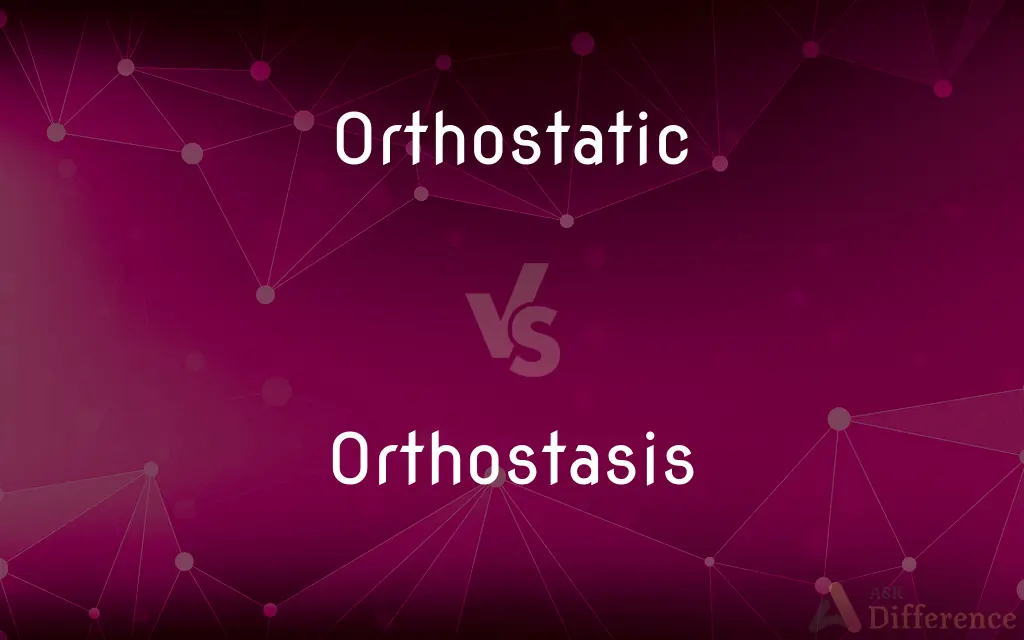Orthostatic vs. Orthostasis — What's the Difference?
By Tayyaba Rehman & Fiza Rafique — Updated on April 9, 2024
Orthostatic refers to relating to or caused by an upright posture, especially the changes due to standing, whereas orthostasis is the condition or act of standing upright.

Difference Between Orthostatic and Orthostasis
Table of Contents
ADVERTISEMENT
Key Differences
Orthostatic is an adjective that describes conditions or phenomena occurring due to an upright posture, highlighting physiological changes when one stands up. On the other hand, orthostasis is a noun that refers specifically to the act or condition of being in an upright position, focusing on the state rather than the changes it causes.
Orthostatic often pertains to medical conditions or symptoms that arise from standing, such as orthostatic hypotension, which is a drop in blood pressure upon standing. Whereas orthostasis simply describes the condition of standing, without inherently implying any change or symptom.
The term orthostatic is used primarily in medical contexts to describe symptoms or disorders related to posture changes, such as orthostatic intolerance. Orthostasis, however, is more general and can be used in various contexts to describe any situation or study involving standing upright.
Orthostatic conditions are usually identified in the context of their symptoms or effects on the body, emphasizing the body's response to standing. Orthostasis, in contrast, does not imply a pathological condition but simply the physical act or state of standing.
While orthostatic is used to qualify conditions or measurements (e.g., orthostatic blood pressure), indicating a relation to posture changes, orthostasis refers to the broader concept of standing upright without specifying the nature of changes or conditions associated with it.
ADVERTISEMENT
Comparison Chart
Part of Speech
Adjective
Noun
Definition
Relating to, caused by, or occurring in an upright posture
The act or condition of standing upright
Context
Mostly medical, describing conditions or symptoms
General and medical, describing a state or act
Implication
Implies changes or symptoms due to standing
Does not imply changes, focuses on the act of standing
Example Use
Describing symptoms like orthostatic hypotension
Referring to the condition of being upright
Compare with Definitions
Orthostatic
Pertaining to an upright posture and its effects on bodily functions.
Orthostatic measurements are crucial for diagnosing certain cardiovascular disorders.
Orthostasis
The ability to stand without experiencing adverse effects.
Patients with certain conditions struggle with maintaining orthostasis.
Orthostatic
Concerned with conditions arising from the transition to standing.
Orthostatic intolerance is a challenge for astronauts readjusting to Earth's gravity.
Orthostasis
The condition or act of standing upright.
Orthostasis is a basic human function that can be affected by various health conditions.
Orthostatic
Relating to symptoms caused by standing.
She experienced orthostatic dizziness after standing up too quickly.
Orthostasis
The physical state of being in an upright position.
Maintaining orthostasis requires a complex balance of bodily systems.
Orthostatic
Associated with the study of standing and its impact on health.
Orthostatic studies help understand the effects of prolonged bed rest.
Orthostasis
A term used in medicine to describe the act of standing.
Orthostasis is often tested in physical examinations.
Orthostatic
Describing changes in physiological parameters due to posture.
Orthostatic blood pressure changes can indicate underlying health issues.
Orthostasis
A physiological state achieved by standing.
Orthostasis engages cardiovascular adjustments to maintain blood flow.
Orthostatic
Relating to or caused by standing upright
Orthostatic hypotension.
Orthostasis
The act of standing upright, commonly used as another term for orthostatic hypotension.
Orthostatic
Relating to orthostasis or orthostatism.
Orthostatic
(archaeology) Relating to an orthostat.
Orthostatic
Pertaining to an upright standing posture;
Orthostatic hypotension
Common Curiosities
What is orthostatic?
Orthostatic refers to anything related to or occurring in an upright posture, especially regarding physiological changes or conditions.
How are orthostatic conditions diagnosed?
They are diagnosed through measurements and observations of symptoms that occur or worsen upon standing.
What does orthostasis mean?
Orthostasis refers to the act or condition of standing upright.
Is orthostatic a medical term?
Yes, it's primarily used in medical contexts to describe posture-related conditions or symptoms.
Are there treatments for orthostatic conditions?
Treatments may include medication, lifestyle adjustments, or specific exercises to improve tolerance to standing.
Does everyone experience orthostasis?
Yes, as it simply refers to the act of standing upright, which is a common human activity.
What factors influence orthostatic tolerance?
Hydration, blood volume, autonomic nervous system function, and muscle tone can all influence orthostatic tolerance.
How is orthostasis tested?
Through physical examinations that observe the body's response to changes in posture, such as standing from a sitting or lying position.
Can exercise improve orthostatic symptoms?
Yes, certain exercises can strengthen the cardiovascular system and improve symptoms associated with orthostatic conditions.
Why is understanding orthostatic important?
It's crucial for diagnosing and managing conditions that affect one's ability to stand or tolerate changes in posture.
Share Your Discovery

Previous Comparison
Emollient vs. Emulsifying
Next Comparison
Tomatillo vs. GooseberryAuthor Spotlight
Written by
Tayyaba RehmanTayyaba Rehman is a distinguished writer, currently serving as a primary contributor to askdifference.com. As a researcher in semantics and etymology, Tayyaba's passion for the complexity of languages and their distinctions has found a perfect home on the platform. Tayyaba delves into the intricacies of language, distinguishing between commonly confused words and phrases, thereby providing clarity for readers worldwide.
Co-written by
Fiza RafiqueFiza Rafique is a skilled content writer at AskDifference.com, where she meticulously refines and enhances written pieces. Drawing from her vast editorial expertise, Fiza ensures clarity, accuracy, and precision in every article. Passionate about language, she continually seeks to elevate the quality of content for readers worldwide.
















































